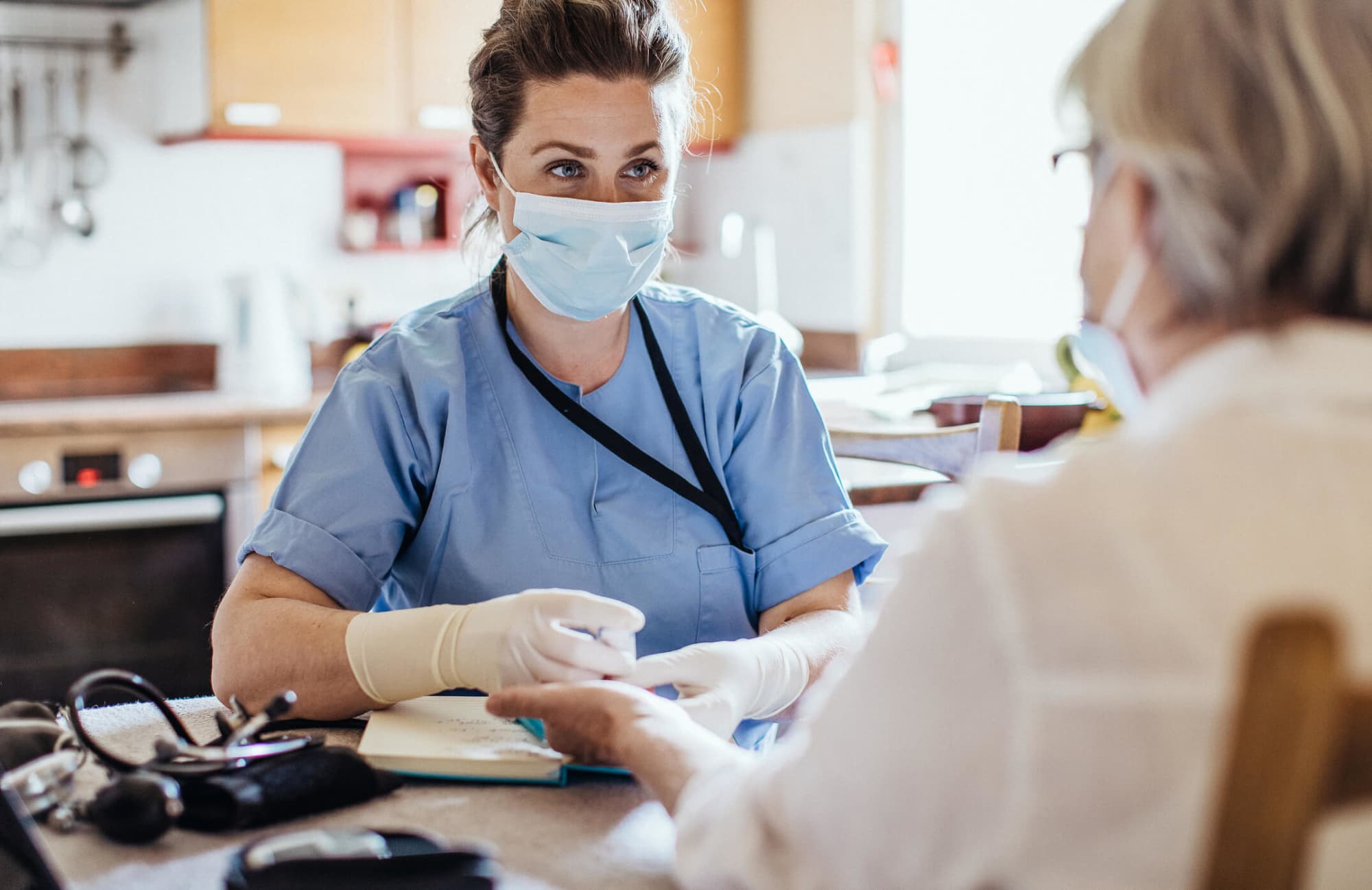Community Health Nurse Career Overview

Community Health Nurse Career in Brief
Community health nurses must be adaptable since they work in various communities outside of the traditional hospital setting. They may, for instance, conduct blood pressure tests in a shopping mall, provide emergency planning in a church, or pass out sex education materials on a college campus. They also coordinate with healthcare teams. Below lists some common responsibilities for community health nurses:
Key Responsibilities
- Community advocacy and organizer
- Assessments, interventions, and evaluations
- Agency referrals
- Health promotion; nutrition, wellness, and disease prevention
- Health screenings
- Family planning education
Career Traits
- Empathy
- Communication
- Clinical skills
- Community advocacy
- Program organizer
- Case management skills
- Critical thinking
- Adaptability

sanjeri / E+ / Getty Images
Where Do Community Health Nurses Work?
Vulnerable communities with disproportionate medical resources need community health nurses. The following workplaces typically benefit from the expertise of community health nurses.
Community Health Clinics
At clinics, community health nurses may provide immunizations, offer family planning counseling, or create healthy living campaigns.
Homeless Shelters
At shelters, community health nurses may focus on preventative care through screenings and assessments. They also help people find assistance through social services.
Home Care
Community health nurses help individuals with physical or mental disabilities with their daily care. Part of the job includes teaching family members how to care for their loved ones.
Why Become a Community Health Nurse?
Becoming a community health nurse offers a chance to work directly in at-risk communities to promote good health and wellness. They help manage educational campaigns to prevent disease and illness and enjoy more flexible schedules since they often do not work weekends.
The job offers many rewards, but it also has some drawbacks. Though working in nonhospital settings provides some freedom, it can also mean less opportunity to consult with healthcare staff. Additionally, healthcare progress can be slower on a community-wide scale. Read below to find out more about community health nursing’s pros and cons.
Advantages to Becoming a Community Health Nurse
Helping vulnerable communities
More collaborative nursing care working with clients in a nonhospital setting
Varied work settings
Convenient schedule with little to no holiday or weekend hours
Holistic and more individualized care
Strong partnership between nurse and client and/or community population
Disadvantages to Becoming a Community Health Nurse
Fewer chances to consult with other healthcare professionals
Must quickly adapt to different lifestyles, settings, and cultures
Must commute to different communities
More time needed to see improvements on a community-level
How to Become a Community Health Nurse
Community Nursing vs. Hospital Nursing
Community nursing differs from hospital nursing in various ways, such as work/life balance and interaction with patients or clients. Read on for further differences.
Community Nursing
- Instead of working in a hospital or clinic, community nurses provide medical care in a client’s personal setting, which can allow for more input from the client or patient.
- Community health nurses’ holistic approach to nursing typically involves more health education.
- While they may get lower pay than hospital nurses, community health nurses usually enjoy a more balanced work/home life.
Hospital Nursing
- Relationships with patients can be less collaborative, seeking less input.
- Hospital nurses have the benefit of easily consulting other healthcare professionals in their workplace.
- Hospital settings tend to promote personal accomplishments among staff more than in community health settings.
- At the same time, hospital nursing can be emotionally exhausting compared to community health nursing, leading to higher burnout.
How Much Do Community Health Nurses Make?
Educational level, experience, work setting, and geographical location all influence salaries for community health nurse jobs, as reflected in community health nurses’ wide salary range. According to PayScale, community health nurses earn on average between $39,000-$84,000 annually.
The national nursing shortage, exacerbated by the pandemic, will continue to fuel a 7% job growth rate through 2029. The U.S. Bureau of Labor Statistics projects employers to add 221,900 RN positions from 2019-2029. On an international scale, an article in British Medical Journal Global Health reports that employers need community health workers, including nurses, especially in poorer countries disproportionately impacted by the coronavirus.
Community health worker programs particularly need nurses trained in preventing and controlling infectious diseases to deliver home-based care to low-income people affected by COVID-19, according to the Centers for Disease Control and Prevention.
Frequently Asked Questions
How long does it take to become a community health nurse?
Community health nurses spend 4-6 years completing their education and training. At a minimum, they must spend two years earning an associate degree in nursing or four years earning their BSN degree. But some also complete a two-year master’s in nursing. Employers often prefer community health nurses who have 1-2 years of nursing experience.
Can community health nurses prescribe medicine?
No. Community health nurses do not prescribe medication. To prescribe medication, nurses need to get a nurse practitioner license. In some states, practitioners can only prescribe medications under a physician’s direction.
What is the difference between a community health nurse and a public health nurse?
Both community health nurses and public health nurses educate the public to promote health and wellness. They may work together to develop health education programs. However, public health nurses might work more directly with policymakers, whereas community health nurses implement policy on the ground level to help address health disparities.
What is the role of the community health nurse?
Addressing disparities in healthcare remains the key role of community health nurses. They work to create educational campaigns and community health programs such as mass immunizations. Their role also includes distributing healthcare materials, such as masks.
Resources for Community Health Nurses
Association of Community Health Nursing Educators
Founded in 1978, the ACHNE focuses on promoting community and public health nursing education and research. Members get access to the membership directory for networking purposes. They can also find lectures and online events through ACHNEs Annual Institute along with a list of public health nurse educational programs.Association of Public Health Nurses
The APHN, which traces its roots back to 1935 when it began as the Association of State and Territorial Directors of Nursing, now serves about 780 members. Members can find opportunities for continuing education and other professional resources. APHN also offers a network for public health nurses to meet.International Home Care Nurses Organization
The IHCNO began in 2009 when Tina Marrelli and Elizabeth Madigan envisioned an international forum for home care nurses. Joining the organization provides the chance to network with home care nurses across the world and access research scholarship grants.Home Healthcare Now
The Home Healthcare Now journal offers timely and relevant news and information for home healthcare and hospice workers. Readers can also find continuing education opportunities through its partnership with NursingCenter.coms CEConnection to meet certification and license renewal requirements.
Related Pages
Reviewed by:

Nicole Galan is a registered nurse who earned a master’s degree in nursing education from Capella University and currently works as a full-time freelance writer. Throughout her nursing career, Galan worked in a general medical/surgical care unit and then in infertility care. She has also worked for over 13 years as a freelance writer specializing in consumer health sites and educational materials for nursing students.
Galan is a paid member of our Healthcare Review Partner Network. Learn more about our review partners.









